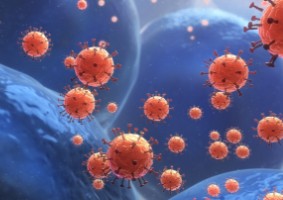Importance of Sample Collection and Transport in the Age of COVID-19

Title: Importance of Sample Collection and Transport in the Age of COVID-19
Presenter: Susan E. Sharp, PhD, (D)ABMM, (F)AAM, MS, MT(ASCP)
Named for its spiked appearance, coronavirus comes in many strains and is one of the major viruses that causes the common cold. During an outbreak, one strain predominates and reinfections are common. It is transmitted by aerosol and direct contact, and symptoms begin two days after infection. They peak two days after that. However, approximately half of infections are asymptomatic.
SARS-COV-2, which causes COVID-19, has proven to be a particularly infectious strain of coronavirus. It originated in Wuhan, China, where it was detected in an open-air “wet market” in which exotic animals are sold as food. It likely originated in bats before jumping from animals to humans.
SARS-COV-2 is transmitted via respiratory droplets, which can be spread up to six feet by coughs or sneezes, and is thought to reach peak respiratory load during the first week of symptoms. Patients can shed a large portion of the virus in the two or three days before symptoms appear, which is a likely route for a large portion of transmissions. The virus is inactivated by soap, alcohol, heat, bleach, and disinfectants, all of which destabilize the lipid bilayer of its envelope.
While a person infected with influenza infects approximately 1.28 other people, those infected with the novel coronavirus infect approximately 2 to 3 other people.
Collecting Specimens for SARS-COV-2 Testing
Proper sample collection and transport play an important role in the accurate and timely identification of a pathogen. When testing for a respiratory virus, the gold standard is a specialized flocked swab used to collect a sample from the nasopharynx. The sample is then transported in viral media.
As SARS-CoV-2 evolved into a global pandemic, swab specimen collection became a popular topic. Researchers and assay manufacturers, as well as the FDA and CDC, discussed different types of swabs and transport media to decide which could be used for sample collection and transport.
The FDA believes that a flocked nasopharyngeal specimen is the preferred choice for swab-based SARS-CoV-2 testing. If a flocked nasopharyngeal specimen is not available, any of the following are acceptable:
- Oropharyngeal (throat) specimen collected by a health care professional (HCP)
- Mid-turbinate specimen by on-site self-collection or HCP (using a flocked tapered swab)
- Anterior nares specimen by on-site self-collection or HCP (using a foam or spun polyester/rayon swab)
Be sure to collect an adequate specimen from the right body site and use an appropriate sampling device and transport media. Collection and transport devices are essential components of the preanalytical process of microbiology testing. These early steps in the preanalytical process are critical to producing clinically relevant information.
Watch the full webinar on demand for more details.
References
- https://www.nejm.org/doi/full/10.1056/NEJMvcm2010260#full
- https://www.fda.gov/medical-devices/emergency-situations-medical-devices/faqs-testing-sars-cov-2#whatif
Watch on Demand Download Slides (PDF, 3.1MB)
This webinar is produced by Whitehat Communications, a provider of continuing education programs in clinical laboratory sciences that has been approved by the ASCLS P.A.C.E.™ Program. One P.A.C.E. credit hour will be provided for this complimentary, basic-level program.
Presenter

Susan E. Sharp, PhD, (D)ABMM, (F)AAM, MS, MT(ASCP)
As a clinical microbiologist and active member of The American Society for Microbiology (ASM) for 30 years, Dr. Susan Sharp has served on various boards and committees. She is a Diplomat of the American Board of Medical Microbiology (ABMM) and a Fellow in the American Academy of Microbiology. Sharp served as the Chair of the ASM Public and Scientific Affairs Board’s Committee on Laboratory Practices from 2007 to 2015, as well as Chair of the Examination Development committee and Vice-Chair of the ABMM from 1999 to 2015. She was selected as the bioMérieux Sonnenwirth laureate, ASM’s highest award for leadership in clinical microbiology, and received ASM’s American Board for Medical Microbiology Professional Recognition Award in 2017.
Sharp recently served as an Advisor to the CLSI Antimicrobial Susceptibility Testing Sub-Committee and is a current member of the CLSI AST Resistance Working Group and the Methods Application and Interpretation Working Group. She is an active member of the Board of Scientific Counselors for the Office of Infectious Diseases of the Centers for Disease Control and Prevention, and a member of the College of Pathologists Microbiology Resource Committee. Sharp is a Past-President of ASM and a former member of ASM’s Board of Directors.
Sharp has also served as a director for microbiology laboratory services for over 30 years and is currently the Scientific Director for Copan Diagnostics, Inc., U.S. She received her B.S. in Medical Technology and her M.S. in Medical Microbiology and Biochemistry from the University of Nebraska Medical Center in Omaha, Nebraska.